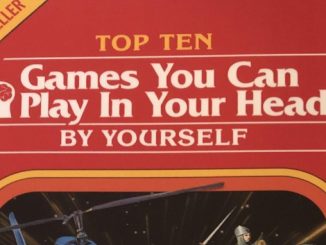
I’ve been neglecting Coursera recently, and to be honest, I’m not sure why. Back in 2012, I was pretty constantly taking courses on the platform – sometimes two or three at a time! But, looking now at my past courses, I haven’t actually taken a course since 2014.
I got an email a while back about a five-course specialisation in Futures Thinking. It sounded really interesting, and a major attraction was that it was being taught by Jane McGonigal. I signed up for the first course, and even went so far as handing over my credit card details knowing fine well I wasn’t going finish during a 7-day trial period. Come to think of it – maybe it was my parsimoniousness that caused the six-year hiatus – once Coursera went to a paid model.
Each course consists of four ‘weeks’ (although they are completely self-paced). I’m currently in week one of Course Four. It is a shame I didn’t go a bit faster, because it is this course which is potentially of most interest to Ludogogy readers, as it is about using games to forecast the future. I will probably post a review of the last two courses between the June and July issues.
Course One: Ready, Set, Future! Introduction to Futures Thinking
In this we learn why we might want to do Futures Thinking, what professional futurists do and we are introduced to the ‘raw materials’ of Futures Thinking – Signals. Signals are all around us. They are real things happening now, which suggest a potential future development. A signal could be a newspaper headline, an image, a new tecnology, or even a creative work like a novel or film.
Futurists take signals and extrapolate potential futures in the form of forecasts. Among the other tools presented in this course are the ‘Four Square Game’, to discover your own attitude towards and specific future, and ‘looking back to look forwards’ – using historical events to to create a timeline which can then be extrapolated into the future.
Course Two: Forecasting Skills: See the Future Before it Happens
The second course looks to build specific skills in forecasting, building on the concepts of the first course. Alongside Signals, we now work with Drivers – the underlying forces behind the signals we have been spotting – which answers the question “What future force is driving the change this signal represents?” For example, we might see a signal in the successful implementation of a new robotic technology, being used to carry out simple task for elderly people, and we might decide that one of the drivers of this is an ageing population.
A number of new tools are introduced in this course, and there is plenty of practice in the process of finding signals and drivers and combining those into forecasts. For me the most enjoyable aspect of this course was taking a forecast and creating a scenario – a specific story based in the forecast future – fleshing out the bones with a narrative about a specific person living in your imagined future.
Course Three: Simulation Skills: This is Your Brain on the Future
This course is packed with new thinking skills to practise. We learn how to predict the past and remember the future – both ‘counter-factual’ techniques where one imagines a different past as if it really happened or a potential future which has never happened, as vividly as if it were a memory. Both of these prepare the mind for creating realistic details and vivid scenarios for futures you’ve never directly experienced.
Along with ‘Hard Empathy’, the ‘Experiential Ladder’ and numerous other techniques, we are ultimately prepared to create compelling visions of the future which appeal to all the senses, or even cross over into reality through the creation of concrete artifacts from the future.
Course Four: Collaborative Foresight: How to Game the Future
I’m only a very short way into this, so I can’t really tell you how it’s going. But I can give you a summary, courtesy of the ‘cheat sheet’ – a document conveniently provided with each of the courses, which tells you what to expect.
In this course I am expecting to (among many other things):
- Collaborate with others on building futures
- Use a future wheel to draw out surprising consequences
- Practice positive and shadow imagination (optimistic and pessimistic futures)
- Conduct massively multiplayer forecasting games
- Define epic wins that help solve urgent problems
It is especially fascinating to be taking these courses just now. Covid-19 is still a major issue, and the focus of Course Three was on using newly learnt skills to forecast a future pandemic situation (it is clear from the videos that the course was finalised before the pandemic). I’m not sure if the course designers will be disappointed that current circumstances mean their learners are no longer having to ‘imagine’ quite so much, or gratified that so much of what they forecast can now be seen clearly playing out around us.
Also, I started the specialisation wanting to explore the futures of Learning and Neurodiversity, but unfolding events mean that I am now looking at the Future of Inequality (or being optimistic, the Future of Equality). So many of the tools I’ve learned are so suitable for this, as they require you to exercise empathy, and one is constantly reminded that the future is not fixed. We can choose to move towards the desirable futures by taking informed action, and away from the undesirable ones by acting to prevent them.
I cannot recommend these courses highly enough. McGonigal is an inspiring instructor, whose passion for her work shines through every video. The tools themselves are easily and immediately applicable to work and life. Although this learning is about the future, the skills it teaches are applicable immediately, leading to increased autonomy and renewed optimism about what is to come. Access this specialisation at https://www.coursera.org/specializations/futures-thinking
- James Bore – The Ransomeware Game - 13th February 2024
- Ipsodeckso – Risky Business - 23rd January 2024
- Review – Luma World Games - 15th December 2023





Be the first to comment